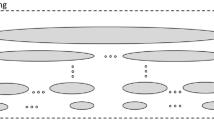Abstract
Domain analysis in software product line (SPL) development provides a basis for core assets design and implementation by a systematic and comprehensive commonality/variability analysis. In feature-oriented SPL methods, products of the domain analysis are domain feature models and corresponding feature decision models to facilitate application-oriented customization. As in requirement analysis for a single system, the domain analysis in the SPL development should consider both functional and nonfunctional domain requirements. However, the nonfunctional requirements (NFRs) are often neglected in the existing domain analysis methods. In this paper, we propose a context-based method of the NFR analysis for the SPL development. In the method, NFRs are materialized by connecting nonfunctional goals with real-world context, thus NFR elicitation and variability analysis can be performed by context analysis for the whole domain with the assistance of NFR templates and NFR graphs. After the variability analysis, our method integrates both functional and nonfunctional perspectives by incorporating the nonfunctional goals and operationalizations into an initial functional feature model. NFR-related constraints are also elicited and integrated. Finally, a decision model with both functional and nonfunctional perspectives is constructed to facilitate application-oriented feature model customization. A computer-aided grading system (CAGS) product line is employed to demonstrate the method throughout the paper.
Similar content being viewed by others
References
Luiz Marcio Cysneiros, Julio Cesar Sampaio do Prado Leite. Nonfunctional requirements: From elicitation to conceptual models. IEEE Trans. Software Eng., 2004, 30(5): 328–350.
Mylopoulos J, Chung L, Nixon B A. Representing and using nonfunctional requirements: A process-oriented approach. IEEE Trans. Software Eng., 1992, 18(6): 483–497.
Sutcliffe A, Minocha S. Scenario-based analysis of nonfunctional requirements. In Proc. Workshop on Requirements Engineering for Software Quality (REFSQ’98) at CAiSE’98, Pisa, Italy, June 8–9, 1998, pp.219–234.
Chung L, Nixon B A, Yu E, Mylopoulos J. Non-Functional Requirements in Software Engineering. Kluwer Academic Publishers, 2000.
Moon M, Yeom K, Chae H S. An approach to developing domain requirements as a core asset based on commonality and variability analysis in a product line. IEEE Trans. Software Eng., 2005, 31(7): 551–569.
Kang K, Cohen S, Hess J, Nowak W, Peterson S. Feature oriented domain analysis (FODA) feasibility study. Technical Report CMU/SEI-90-TR-21, Software Engineering Institute, Carnegie Mellon University, Pittsburgh, PA, November 1990.
Kang K C, Donohoe P, Koh E, Lee J, Lee K. Using a marketing and product plan as a key driver for product line asset development. In Proc. the 2nd Int. Conf. Software Product Lines (SPLC), San Diego, CA, USA, August 19–22, 2002, pp.366–382.
Zhang W, Mei H, Zhao H. Feature-driven requirement dependency analysis and high-level software design. Requirements Eng., 2006, 11(3): 205–220.
Cristina Gacek, Michalis Anastasopoules. Implementing product line variabilities. In Proc. the 2001 Int. Software Reusability Symp. (SSR), Toronto, Ontario, Canada, May 18–20, 2001, pp. 109–117.
Peng X, Zhao W, Xue Y, Wu Y. Ontology-based feature modeling and application-oriented tailoring. In Proc. the 9th Int. Conf. Software Reuse (ICSR), Turin, Italy, June 12–15, 2006, pp.87–100.
Peng X, Shen L, Zhao W. Feature implementation modeling based product derivation in software product line. In Proc. the 10th Int. Conf. Software Reuse (ICSR), Beijing, China, May 25–29, 2008, pp.142–153.
Halmans G, Pohl K. Communicating the variability of a software-product family to customers. Software and System Modeling, 2003, 2(1): 15–36.
Jin Z. Revisiting the meaning of requirements. J. Comput. Sci. & Technol., 2006, 21(1): 32–40.
Liu L, Yu E, Mylopoulos J. Security and privacy requirements analysis within a social setting. In Proc. the 11th IEEE Int. Conf. Requirements Engineering (RE), Monterey Bay, CA, USA, September 8–12, 2003, pp.151–161.
Wu Y, Zhao W, Peng X, Xue Y. A computer aided grading system for subjective tests. In Proc. the 2006 Advanced Int. Conf. Telecommunications and Int. Conf. Internet and Web Applications and Services (AICT/ICIW), Guadeloupe, French Caribbean, February 19–25, 2006, p.2.
Yu Y, Lapouchnian A, Liaskos S, Mylopoulos J, Leite J C S P. From goals to high-variability software design. In Proc. the 17th Int. Symposium on Methodologies for Intelligent Systems (ISMIS), Toronto, Canada, May 20–23, 2008, pp.1–16.
Liaskos S, Lapouchnian A, Yu Y, Yu E, Mylopoulos J. On goal-based variability acquisition and analysis. In Proc. the 14th IEEE International Conference on Requirements Engineering (RE), Minnesota, USA, September 11–15, 2006, pp.76–85.
Lee S W, Gandhi R A. Ontology-based active requirements engineering framework. In Proc. the 12th Asia-Pacific Software Eng. Conf. (APSEC), Dec. 15–17, 2005, pp.481–490.
Lee S W, Gandhi R A. Requirements as enablers for software assurance. CrossTalk: The Journal of Defense Software Engineering, 2006, 19(12): 20–24.
Lee S W, Muthurajan D, Gandhi R A, Yavagal D, Ahn G. Building decision support problem domain ontology from security requirements to engineer software-intensive systems. Int. Journal on Software Eng. and Knowledge Eng., 2006, 16(6): 851–884.
Author information
Authors and Affiliations
Corresponding author
Additional information
This work is supported by the National Natural Science Foundation of China under Grant Nos. 60703092 and 90818009, the National High Technology Research and Development 863 Program of China under Grant No. 2007AA01Z125.
Rights and permissions
About this article
Cite this article
Peng, X., Lee, SW. & Zhao, WY. Feature-Oriented Nonfunctional Requirement Analysis for Software Product Line. J. Comput. Sci. Technol. 24, 319–338 (2009). https://doi.org/10.1007/s11390-009-9227-2
Received:
Revised:
Published:
Issue Date:
DOI: https://doi.org/10.1007/s11390-009-9227-2




